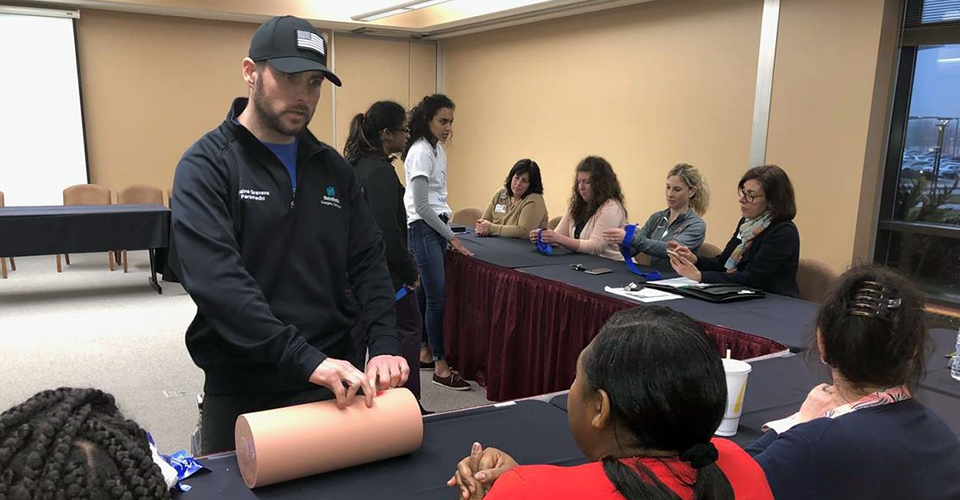Not all of us at NEOMED are health care students or faculty — but that doesn’t mean we can’t help if confronted by a bleeding emergency. Members of the Stop the Bleed student interest group recently conducted a hands-on training session to teach anyone interested how to use a tourniquet — or create a makeshift one from available items like a scarf and a pen, or a T-shirt and a sturdy stick – to provide emergency help for serious bleeding.
Lydia Du, a second-year student in the College of Medicine, led the training by her fellow students, who included Blaine Gravens (M2). The president of the Emergency Medicine student interest group, Gravens added to Du’s remarks with his own experience as a paramedic.
“High and tight” are the key words to remember when applying a tourniquet to stop the bleeding, the students said. A tourniquet is only needed for serious emergencies, the trainers reminded us. Leave it to a professional to remove it, once it’s on. And remember: If the person complains that the tourniquet hurts, it’s probably tight enough to do its job.
Terri Moncoveish, a police officer at NEOMED, was in the room, helping participants brainstorm about what they could use as a makeshift tourniquet and windlass (the rod-like piece used to tighten the tourniquet). She reminded the group that all NEOMED police officers are equipped with a tourniquet.
Civilians can carry one, too, said the students. If you want to be prepared, be sure that the one you purchase has the raised hand logo of the Stop the Bleed campaign, so that you know the quality is good.
Seeing the need
Stop the Bleed is a national awareness campaign designed to encourage everyday people to become trained to help in a bleeding emergency.
Du and her Stop the Bleed co-president Mackenzie Jackson (M2) started the campus training sessions last year, as a project of the Association of Women Surgeons, and then developed Stop the Bleed into its own student interest group. They’d like to go even bigger, to provide training to community members and also supply them with emergency kits, says Du.
Tiffany Marchand, M.D., assistant professor of surgery and a faculty advisor to the group, says the initiative is valuable for more than one reason. Leading training sessions teaches these medicine students how to teach. And considering the number of mass casualties that have happened on campuses, these are valuable skills for the students to know and communicate with others.
The hour-long training also included instruction on how to pack a wound in an emergency situation. Stop the Bleed was sponsored by Women in NEOMED, which last year conducted CPR training.
